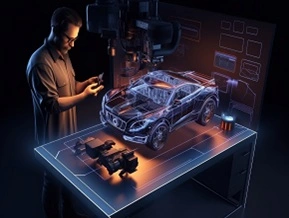The Machine Learning in Automotive Industry course is designed to equip learners with the knowledge and skills to understand and apply machine learning technologies within the automotive sector.
Machine Learning in Automotive Industry
The Machine Learning in Automotive Industry course is designed to equip learners with the knowledge and skills to understand and apply machine learning technologies within the automotive sector. From predictive maintenance to autonomous driving, machine learning is revolutionizing the automotive world. This course explores how data-driven models are shaping vehicle systems, performance, and user experience. Through real-world applications and hands-on insights, learners will gain a practical understanding of how machine learning powers innovation in connected, autonomous, and smart vehicles. Whether you're a professional or a curious learner, this course serves as a gateway to understanding the critical role of machine learning in the automotive industry.
This course is ideal for engineers, data scientists, AI enthusiasts, automotive professionals, and students interested in the intersection of artificial intelligence and automotive technology. It is also well-suited for professionals in transportation, mechanical engineering, and computer science who are looking to explore how machine learning is transforming the automotive industry. Whether you're aiming to implement ML models in automotive applications or simply want to understand current industry trends, this course offers valuable insights. A basic understanding of programming and data analysis is recommended but not required.
Understand the fundamentals of machine learning in automotive industry applications.
Explore data acquisition, preprocessing, and modelling specific to automotive systems.
Apply machine learning techniques to predictive maintenance.
Analyse the role of ML in autonomous driving and driver-assistance technologies.
Utilize ML algorithms to optimize fuel efficiency and vehicle performance.
Examine how machine learning supports smart and connected vehicle systems.
Identify future trends and address challenges in machine learning automotive industry innovations.
-
Discover how machine learning is being used in automotive systems and the key technologies driving change in the sector.
-
Learn about data sources from vehicle sensors, telematics, and onboard diagnostics, and how to clean and prepare this data for machine learning models.
-
Explore predictive analytics to anticipate component failures and reduce downtime, using real-world vehicle maintenance datasets.
-
Understand the critical role of ML in self-driving vehicles, including decision-making algorithms, path planning, and sensor fusion.
-
Learn how ML powers systems like adaptive cruise control, lane-keeping assist, and collision avoidance.
-
Discover how machine learning improves engine tuning, reduces emissions, and enhances energy efficiency using data-driven models.
-
Study the application of ML in vehicle-to-vehicle (V2V) and vehicle-to-infrastructure (V2I) communication, and connected car ecosystems.
-
Explore ethical, regulatory, and technological challenges, as well as upcoming trends such as generative AI and real-time model deployment in cars.
Earn a Professional Certificate
Earn a certificate of completion issued by Learn Artificial Intelligence (LAI), accredited by the CPD Standards Office and recognised for supporting personal and professional development.

Key Aspects of Course

CPD Accredited
Earn CPD points to enhance your profile

Free Course
This course is free to study

Self-Paced
No time limits or deadlines

Flexible & 24/7 Access
Learn anytime, anywhere

Build In-Demand Skills
Get job ready

Updated AI Skills
Stay current with AI advancement

Global Learning
Accessible Worldwide

Premium Materials
High-quality resources

Employer Approved
Boost your career prospects



